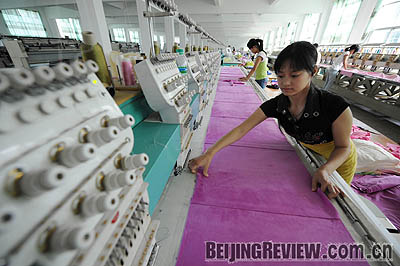|
 READY FOR THE WORST: Apart from government support, small and medium-sized enterprises need to look at their own quality of products to survive the tough time ahead
READY FOR THE WORST: Apart from government support, small and medium-sized enterprises need to look at their own quality of products to survive the tough time ahead
Practical Patents Needed
When it comes to patent application, Chinese universities seem to have far outperformed their foreign counterparts. Since 2000, patent applications by Chinese universities have grown fast and now account for 11.7 percent of the country's total. By contrast, the percentage is only 4 percent for U.S. universities. The conundrum is that China's many patent applications have yielded meager economic benefits, while U.S. universities rake in over $1 billion from their patents annually.
Many Chinese universities and research institutions, in a crazy rush to register patents, care little about whether their patents are economically significant and they even have little regard for whether their patent rights can be authorized. For most of them, the large numbers of patent applications are used to cover up their disappointing academic achievements.
At the present stage, the lack of proprietary core technologies is emerging as a bottleneck for the further development of many of China's local industries. It's now imperative for the academic community to take into full consideration the actual value of their inventions.
Guangzhou Daily
Housing Intervention May Backfire
Recently, two major cities in the Yangtze River Delta region, Shanghai and Hangzhou in Zhejiang Province, joined other cities in the campaign to shore up the local real estate market. In Hangzhou,the local government announced to offer tax rebates to homebuyers. Shanghai raised the ceiling of government-backed provident mortgage loan to 600,000 yuan ($86,000) from previous 500,000 yuan ($72,000) in hopes of stimulating demand.
The recession in the real estate sector is bound to slow down a region's economic growth and reduce many local governments' tax revenues. Considering the economic loss, some local governments chose to side with developers, consequently incurring the public's dissatisfaction with their collaboration.
Before the government takes action to revitalize the real estate market, it must take into full consideration the moral risk involved. It can't expect ordinary people to think in the way that officials do. They will judge the policies by the impact on their daily lives.
The efforts to boost the real estate market will inevitably touch problems such as fair distribution of wealth and the gap between the rich and the poor. It's very important for the government to balance impacts on the two groups, who, at the present stage, seem to be in direct conflict.
Qilu Evening News
Tollgates Are Cash Cows
A map of the tollgates in north China's Shanxi Province is being passed around online to show the astonishing number of these points in this area.
This map triggered anger among the public after it was confirmed by locals that the map is authentic. Toll roads in many places have become "problematic roads."
According to reports from China's National Audit Office, by 2007, 16 provinces and municipalities had set up 158 unauthorized toll gates along 100 roads and, by the end of 2005, they had at least illegally charged 14.9 billion yuan ($2.13 billion) in tolls.
The Ministry of Transportation has stipulated that only one tollgate is allowed within 40 km of a road section. This September, the ministry, along with the National Development and Reform Commission and the Ministry of Finance, jointly released a circular, stating that the period of toll charging for profit-oriented roads should not exceed 25 years.
However, in the face of the astonishing tollgate network in Shanxi, we have to consider whether it's right to keep on with this policy. The public is wondering why, when in many countries roads either do not charge tolls or charge very little, China's road users have to face densely-dotted tollgate networks. Actually, the citizens have already paid for the use of roads through taxation.
It's time for the government to reassess its road toll policy.
The Beijing News
SMEs Bailout Package
Against the backdrop of the global financial turmoil, China's small and medium-sized enterprises (SMEs) are expected to see their growth slowing down in the following months. How to help these businesses survive the tough time is a test of the government's governance capacity.
SMEs have become a strong driving force for the country's economic growth, which contribute 50 percent of tax revenues and provide 70 percent of total job opportunities. However, these businesses are faced with numerous challenges, fundraising being the biggest one.
In order to get the businesses out of the plight, many local governments have worked together with financial institutions by setting up microfinance lenders and launching specially designed financial products. Nevertheless, cash injections have a limited impact. The most effective way is to help SMEs increase the added value of their products through enhanced policy supports in terms of personnel and technology transfers, so as to strengthen their competitiveness in the international market.
Meanwhile, SMEs should also try their best to improve their operations, so that they can make it through the bleak days ahead.
Guangzhou Daily
| 